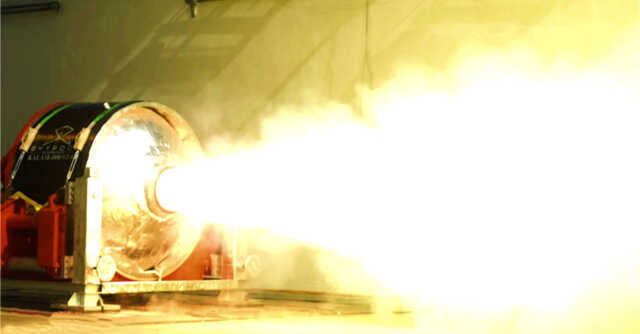
Indian space startup Skyroot nears first launch with successful test-firing


Private Indian space-tech startup, Skyroot Aerospace, has successfully conducted a full duration rocket stage test firing, earlier today. The main rocket stage is named Kalam-100, and will power the company’s Vikram-1 orbital launch vehicle — set for its first test launch later this year.
Skyroot, along with fellow private Indian space-tech company Agnikul Cosmos, are among the makers of private rockets that are in final development stages. Earlier this year, Skyroot raised $4.5 million to fund the development of critical infrastructure building up to the launch of Vikram-1.
The static testing of the Kalam-100 rocket stage for Vikram-1 took place in Nagpur, at facilities owned by Solar Industries India Limited. The latter, alongside offering the testing pad for Skyroot, also enabled propellant processing tests for the rocket stage. Manish Nuwal, managing director and chief executive officer of Solar Industries, claimed in a statement that Kalam-100 was “the largest rocket stage ever designed, manufactured, and tested completely in the Indian private sector.”

A rocket typically has multiple “stages”, or levels of engine ignition that helps its propulsion to orbit. While different phases of a rocket’s journey requires varying amounts of power to be delivered, different stages are often tested separately in order to validate the course to be charted by a rocket.
For instance, the booster stage of a rocket requires more power since it offers the thrust that takes the rocket beyond escape velocity (the speed required for it to exceed the gravitational pull of earth).
Eswaran VG, vice president of propulsion at Skyroot, added that the test of the rocket stage validated various technologies that would be part of Vikram-1, such as “carbon composite case, high propellant volumetric loading upto 94%, lighter EPDM based thermal protection system, and submerged nozzle.”

To be sure, Skyroot’s compatriot Agnikul is also expected to launch its lightweight, fully 3D-printed orbital launch vehicle, Agnibaan, by the end of this year itself. The company had last year showcased its indigenously built engine, and at the time, Moin SPM, chief operating officer of Agnikul Cosmos, had told Mint that the company aims to make at least two launches this year.
Moin had also said that the company had already signed clients for its maiden journeys.
Among other space-tech players from India, satellite imagery startup Pixxel launched its first satellite, to be part of its low-earth orbit constellation, aboard a SpaceX Falcon 9 last month. The company’s next launch is expected to be with the Indian Space Research Organisation (ISRO)’s upcoming commercial mission.

Bellatrix Aerospace, which is building green thrusters for orbital transfer of satellites — and eventually a “space taxi” service of sorts for orbit-to-orbit deployment of satellites — is expected to make its first commercial launches by 2023.
